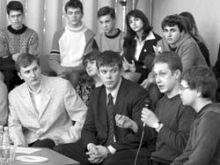A citizen is formed in school. This maxim was confirmed by a recent session of the “Kyiv Children’s Parliament,” where youngsters from many regions of Ukraine addressed by no means childish problems.
The forum’s participants told The Day about the “children’s parliament” and explained why senior school pupils find it interesting. They emphasized that theirs is a civic organization, although these young “parliamentarians” also have their own political views. The “children’s parliament” is above all an excellent school of self-management, which tackles problems of leisure, environment, law, and education.
These kinds of children’s associations already exist in many cities and raions in Ukraine and are supported by local authorities. Young politicians are successfully studying international experience by establishing cooperation with their peers in Russia, Canada, and Belarus.
The Day asked Volodymyr Hryzodub, a young parliamentarian from Dnipropetrovsk, to explain what leads teenagers to choose this kind of civic activity. “At a certain point teenagers feel caged in by the school-home-interest-club triangle,” the schoolboy says. “This triangle can only offer the experience of taking, while we already want to give and create. In addition, the school of children’s parliamentarianism is an excellent mental exercise and promotes the formation of leadership traits. We are entering ‘small-scale’ politics in order to manifest ourselves later in ‘large-time’ politics.”
“We are a totally new generation,” Volodymyr says, “and we don’t exactly like what adults are doing — all this mud-slinging in these elections, for example. I hope that when we enter big politics, there will be no mud-slinging at all.”
But even young parliamentarians are not immune to political preferences, which the forum’s concluding roundtable amply illustrated. As long as the debate dealt with matters of nationwide concern (combating AIDS, healthy lifestyles, environmental protection), things went smoothly.
An absolutely un-childlike “explosion” occurred when the forum raised the question of granting Russian the status of second official language. Once representatives of the Lytvyn Bloc’s youth branch acknowledge the possibility of holding a language referendum, the young politicians flew into a rage, and the audience was immediately divided. The chief argument of the referendum supporters was that, by force of historical circumstances, half of the Ukrainian population speaks Russian.
This triggered a stormy reaction from the Ukrainian-language audience, which demanded that historical justice first be restored, followed by changes to the current situation in which the Ukrainian language requires protection and development.
This example shows that we should put the language question on hold because it is causing a rift even among children. Moreover, it is high time for some important politicians to understand that the resolution of some problems can really unite Ukraine while the tackling of others will only disunite this country. And if they lack their own experience, let them turn for help to children.







